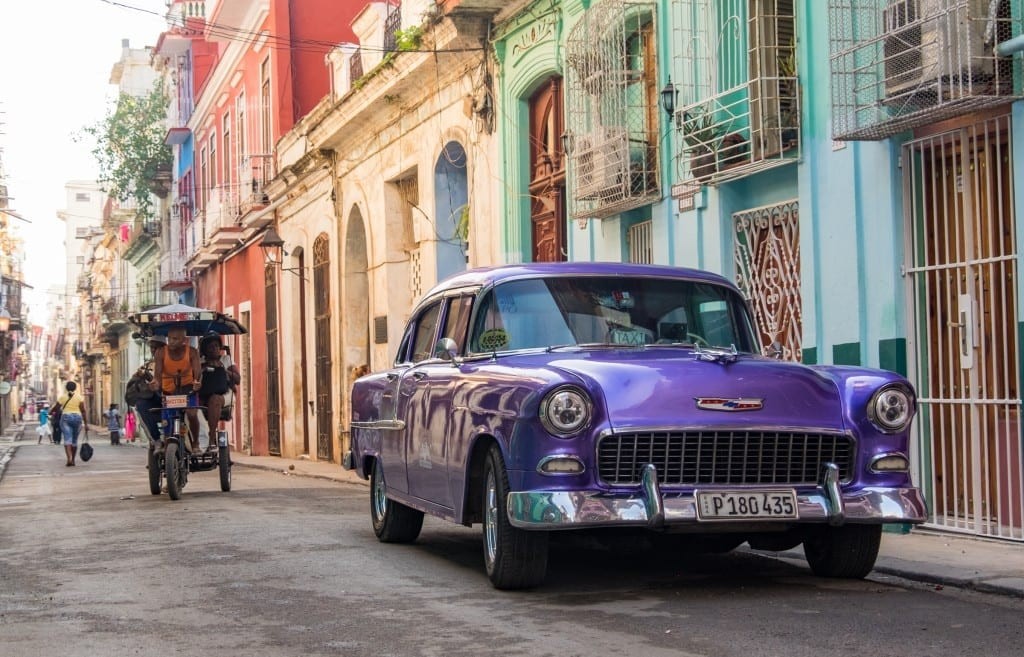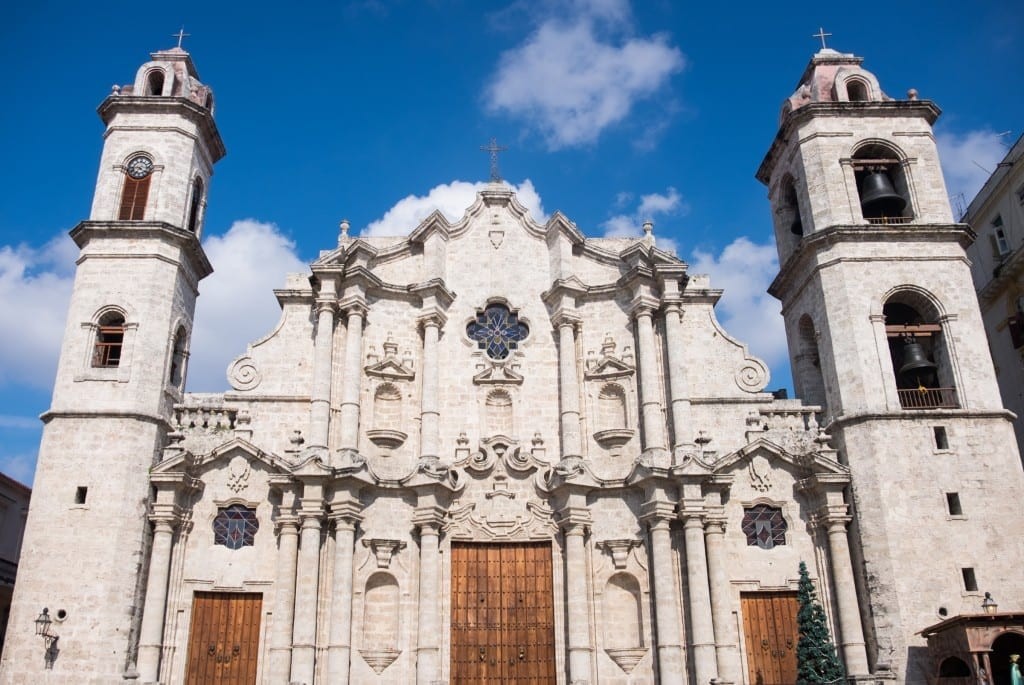Are you dreaming of exploring Cuba’s vibrant culture and stunning landscapes from Florida? You absolutely can! SIXT.VN is here to guide you through everything you need to know about traveling to Cuba legally and hassle-free. Discover the latest regulations, visa options, and essential tips for an unforgettable journey.
1. What Are The Current Travel Restrictions For Americans Traveling To Cuba?
Yes, Americans can travel to Cuba. While there have been some changes to the regulations over the years, it’s still entirely possible for US citizens to visit Cuba legally. The key is understanding the permitted travel categories and ensuring you comply with all requirements.
The regulations are primarily managed by the U.S. Department of the Treasury’s Office of Foreign Assets Control (OFAC). It’s crucial to stay informed about any updates or changes to these regulations before planning your trip.
1.1 Understanding OFAC’s 12 Authorized Travel Categories
OFAC has established 12 authorized travel categories under which Americans can obtain a general license to visit Cuba. These categories include:
- Family visits
- Official business of the U.S. government, foreign governments, and certain intergovernmental organizations
- Journalistic activity
- Professional research and professional meetings
- Educational activities
- Religious activities
- Public performances, clinics, workshops, athletic and other competitions, and exhibitions
- Support for the Cuban people
- Humanitarian projects
- Activities of private foundations or research or educational institutes
- Exportation, importation, or transmission of information or informational materials
- Certain export transactions
1.2 How To Travel Under The “Support For The Cuban People” Category
The “Support for the Cuban People” category is a popular option for tourists. To qualify, your activities must:
- Strengthen civil society in Cuba
- Promote independence from Cuban authorities
- Result in meaningful interaction with individuals in Cuba
You’ll need to maintain a full-time schedule of activities that enhance contact with the Cuban people, support human rights, or promote independent activity.
1.3 What Activities Qualify Under This Category?
Here are some examples of activities that may qualify:
- Staying in privately owned accommodations (casas particulares)
- Eating at privately owned restaurants (paladares)
- Shopping at privately owned stores
- Participating in activities with local Cuban entrepreneurs
- Taking Spanish classes
- Visiting art galleries and museums
- Exploring historic sites and cultural attractions
1.4 Activities That Do Not Qualify Under This Category
Avoid activities that primarily benefit the Cuban government, such as:
- Staying at hotels on the Cuba Restricted List
- Eating at restaurants on the Cuba Restricted List
- Shopping at stores on the Cuba Restricted List
The U.S. State Department maintains a Cuba Restricted List of entities and subentities that are under the control of, or act for or on behalf of, the Cuban military, intelligence, or security services or entities. Americans are prohibited from engaging in direct financial transactions with these entities.
 Havana street with classic cars and colorful buildings
Havana street with classic cars and colorful buildings
2. What Are The Different Ways To Obtain A Cuban Visa From Florida?
There are a few different ways to obtain a Cuban visa, also known as a tourist card, depending on your travel plans:
- Direct Flights from the U.S.: If you’re flying directly to Cuba from the U.S., you’ll typically purchase a “pink tourist card” at the airport before boarding.
- Flights via Other Countries: If you’re flying to Cuba through another country like Mexico or Canada, you’ll need a “green tourist card,” which can be purchased at the departure airport in that country.
- Travel Agencies: Some travel agencies specializing in Cuba travel can assist with visa processing.
2.1 Step-By-Step Guide To Getting A Cuban Visa At Miami Airport
If you’re flying from Miami International Airport (MIA), here’s what you need to do to obtain your Cuban visa:
- Locate the airline counter for your flight to Cuba.
- Ask the airline representative about purchasing a Cuban tourist card.
- Complete the application form provided.
- Pay the required fee (usually around $100 USD).
- Receive your tourist card.
2.2 How Long Is A Cuban Tourist Card Valid For?
A Cuban tourist card is valid for a single entry into Cuba and allows you to stay for a maximum of 30 days. It’s essential to ensure your travel dates align with the validity of your tourist card. You can extend your stay for another 30 days while in Cuba by visiting a local immigration office.
2.3 What Documents Do I Need To Apply For A Cuban Visa?
To apply for a Cuban visa, you’ll typically need:
- A valid U.S. passport
- A completed application form
- Proof of travel insurance
- A copy of your flight itinerary
- Payment for the visa fee
2.4 Can I Get A Cuban Visa Online?
While some websites offer online visa services, it’s generally recommended to purchase your tourist card directly from the airline or a reputable travel agency to ensure its validity.
3. Can I Fly Directly From Florida To Cuba?
Yes, you can fly directly from Florida to Cuba. Several airlines offer nonstop flights from Florida cities like Miami and Fort Lauderdale to Havana and other Cuban destinations.
3.1 Airlines That Offer Direct Flights From Florida To Cuba
Here are some of the airlines that operate direct flights:
- American Airlines
- JetBlue
- Southwest Airlines
- CubaJet
According to the Bureau of Transportation Statistics, the average number of direct flights from Florida to Cuba per week is around 70, with Miami International Airport (MIA) being the primary departure point.
3.2 What Are The Average Flight Times And Costs?
The average flight time from Miami to Havana is approximately 1 hour and 15 minutes. Flight costs can vary depending on the airline, time of year, and booking time. On average, you can expect to pay between $300 and $600 for a round-trip ticket.
3.3 Tips For Finding Cheap Flights To Cuba
Here are some tips to help you find cheap flights:
- Book in advance (2-3 months before your travel date)
- Be flexible with your travel dates
- Consider flying during the off-season
- Set up fare alerts to track price changes
4. What Travel Insurance Do I Need For Cuba?
Travel insurance is mandatory for all visitors to Cuba. You’ll need to show proof of insurance upon arrival. Your insurance policy must cover medical expenses, evacuation, and repatriation.
4.1 Finding Travel Insurance That Covers Cuba
Ensure that your travel insurance policy explicitly covers Cuba. Some U.S.-based insurance companies may not provide coverage due to the U.S. embargo. Opt for international insurance providers that offer comprehensive coverage for Cuba.
According to a report by the World Tourism Organization, travel insurance is a key component of responsible tourism, ensuring the safety and well-being of travelers while also protecting local communities.
4.2 Key Coverage Aspects To Look For
When choosing travel insurance for Cuba, make sure it includes:
- Medical expenses
- Emergency evacuation
- Repatriation
- Trip interruption
- Lost or stolen belongings
4.3 Popular Travel Insurance Providers For Cuba
Here are some reputable travel insurance providers that cover Cuba:
- Allianz Travel Insurance
- World Nomads
- Travel Guard
- Seven Corners
Keep in mind that travel insurance policies can vary in their terms and conditions, so it’s important to carefully review the policy details before purchasing.
5. What Should I Know About Money And Finances In Cuba?
Due to the U.S. embargo, there are several important things to keep in mind regarding money and finances in Cuba.
5.1 Why Can’t Americans Use Credit Or Debit Cards In Cuba?
U.S.-issued credit and debit cards generally do not work in Cuba due to the U.S. embargo. The Cuban financial system is largely disconnected from the international banking network, making it impossible to process transactions with American cards.
5.2 What Is The Best Way To Bring Money To Cuba?
The best way to bring money to Cuba is in cash. You can bring U.S. dollars, Euros, or Canadian dollars. However, it’s generally recommended to bring Euros or Canadian dollars, as they may have slightly better exchange rates than U.S. dollars.
5.3 Where Can I Exchange Money In Cuba?
You can exchange money at:
- Airports
- Banks
- Hotels
- Official exchange houses (CADECA)
It’s advisable to exchange money at official exchange houses (CADECA) or banks for the best rates. Be prepared for long lines and bring your passport for identification.
5.4 Understanding Cuba’s Two Currencies: CUP And MLC
Cuba has two official currencies:
- Cuban Peso (CUP): Used mainly by locals for day-to-day transactions.
- Freely Convertible Currency (MLC): Used to purchase certain goods and services, often in special stores.
As a tourist, you’ll primarily use CUP. Be aware of the exchange rates and always double-check your change.
 A close-up of Cuban currency, both CUP and CUC
A close-up of Cuban currency, both CUP and CUC
6. What Are The Best Places To Visit In Cuba?
Cuba offers a diverse range of attractions, from historic cities to stunning natural landscapes.
6.1 Havana: A City Frozen In Time
Havana, the capital of Cuba, is a vibrant city known for its colorful architecture, classic cars, and rich history.
6.2 Must-See Attractions In Havana
- Old Havana (Habana Vieja): A UNESCO World Heritage site with cobblestone streets and colonial buildings.
- Malecón: A scenic waterfront promenade perfect for strolling and enjoying the sunset.
- Plaza de la Revolución: A historic square with iconic monuments and government buildings.
- Museo de la Revolución: A museum that chronicles the history of the Cuban Revolution.
- El Capitolio: A replica of the U.S. Capitol Building.
6.3 Viñales: Lush Landscapes And Tobacco Farms
Viñales is a picturesque valley known for its stunning landscapes, tobacco farms, and unique limestone hills called mogotes.
6.4 Top Activities In Viñales
- Visit a tobacco farm and learn about the cigar-making process
- Explore the Viñales Valley on horseback
- Hike through the mogotes and enjoy panoramic views
- Visit the Cueva del Indio, an underground cave with a river
6.5 Trinidad: A Colonial Gem
Trinidad is a well-preserved colonial town known for its colorful architecture, cobblestone streets, and vibrant music scene.
6.6 Things To Do In Trinidad
- Explore the historic center, a UNESCO World Heritage site
- Visit the Plaza Mayor, the main square surrounded by colonial buildings
- Take a salsa dancing lesson
- Relax on the beaches of Playa Ancón
- Hike to the Topes de Collantes National Park
6.7 Other Notable Destinations In Cuba
- Varadero: A popular beach resort town with turquoise waters and white sand beaches.
- Cienfuegos: A charming coastal city known for its French colonial architecture.
- Santiago de Cuba: The second-largest city in Cuba, known for its vibrant culture and music.
- Bay of Pigs: A historic site where the failed U.S.-backed invasion took place in 1961.
7. What Are Some Cultural Tips And Etiquette For Cuba?
Respecting local customs and traditions is essential for a meaningful and enjoyable travel experience.
7.1 Greeting People
Cubans are generally warm and friendly. A handshake is common for formal greetings, while a kiss on the cheek is typical among friends and family.
7.2 Tipping
Tipping is customary in Cuba, especially in the tourism industry. It’s common to tip:
- Waiters: 10-15%
- Taxi drivers: 10%
- Porters: $1 per bag
- Tour guides: $5-10 per day
7.3 Dress Code
The dress code in Cuba is generally casual. However, when visiting religious sites, it’s respectful to dress modestly, covering your shoulders and knees.
7.4 Cultural Sensitivities
- Avoid discussing sensitive political topics in public.
- Be mindful of the economic hardships faced by many Cubans.
- Respect the local culture and traditions.
- Always ask for permission before taking photos of people.
- Learn a few basic Spanish phrases to enhance your interactions.
7.5 Embrace The Cuban Spirit
Cubans are known for their resilience, resourcefulness, and love of life. Embrace the Cuban spirit by:
- Enjoying the music and dance
- Savoring the local cuisine
- Engaging with the friendly locals
- Being open to new experiences
8. What About Internet Access In Cuba?
Internet access in Cuba can be limited and unreliable.
8.1 How To Access The Internet In Cuba
The most common way to access the internet in Cuba is through Wi-Fi hotspots. You’ll need to purchase a Wi-Fi card from ETECSA, the state-owned telecommunications company. These cards provide you with a username and password to access the internet at designated hotspots.
According to a report by Freedom House, internet access in Cuba is among the most restricted in the world, with high costs and limited availability.
8.2 Tips For Staying Connected
- Purchase Wi-Fi cards in advance to avoid long lines.
- Use a VPN to protect your data and privacy.
- Download maps and other essential information before your trip.
- Inform your family and friends that you may have limited internet access.
- Embrace the opportunity to disconnect and enjoy your surroundings.
8.3 Alternatives To Wi-Fi Hotspots
Some hotels offer Wi-Fi access for guests, but it can be expensive and unreliable. Another option is to purchase a local SIM card with a data plan, but this may require unlocking your phone and navigating complex regulations.
 People using their phones in a Havana park, connected to Wi-Fi
People using their phones in a Havana park, connected to Wi-Fi
9. What Are The Accommodation Options In Cuba?
Cuba offers a range of accommodation options, from hotels to casas particulares (private homes).
9.1 Casas Particulares: Authentic Cuban Experience
Casas particulares are private homes that offer rooms or apartments for rent. Staying in a casa particular is a great way to:
- Experience authentic Cuban culture
- Support local families
- Enjoy personalized service
- Get insider tips from your hosts
9.2 Tips For Booking A Casa Particular
- Use reputable booking platforms like Airbnb or Booking.com.
- Read reviews from other travelers.
- Communicate with the host in advance to confirm your booking and ask any questions.
- Be prepared to pay in cash upon arrival.
- Respect the house rules and be mindful of your hosts’ privacy.
9.3 Hotels: Comfort And Convenience
Cuba has a variety of hotels, ranging from budget-friendly options to luxurious resorts. Hotels offer:
- Comfortable accommodations
- Convenient amenities
- On-site restaurants and bars
- Organized tours and activities
9.4 Considerations When Choosing A Hotel
- Check the Cuba Restricted List to ensure the hotel is not affiliated with the Cuban government.
- Read reviews from other travelers.
- Compare prices and amenities.
- Book in advance, especially during peak season.
10. How Can SIXT.VN Make My Trip To Cuba Easier?
SIXT.VN offers a range of services to help you plan and enjoy your trip to Cuba, including:
10.1 Personalized Travel Itineraries
Our team of travel experts can create a custom itinerary tailored to your interests and preferences. We’ll take care of the details, so you can focus on enjoying your trip.
10.2 Airport Transfers
We offer reliable and comfortable airport transfer services to and from Cuban airports. Our drivers will meet you at the airport and take you directly to your accommodation.
10.3 Accommodation Booking
We can help you find and book the perfect accommodation for your trip, whether it’s a casa particular, a hotel, or a resort.
10.4 Guided Tours
We offer a variety of guided tours to help you explore Cuba’s top attractions, from historic cities to stunning natural landscapes.
10.5 24/7 Support
Our customer support team is available 24/7 to assist you with any questions or concerns you may have during your trip.
Planning a trip to Cuba from Florida can seem daunting, but with the right information and preparation, it can be an unforgettable experience. Let SIXT.VN be your trusted partner in creating the Cuban adventure of your dreams.
Contact us today to start planning your trip!
Address: 260 Cau Giay, Hanoi, Vietnam
Hotline/Whatsapp: +84 986 244 358
Website: SIXT.VN
Frequently Asked Questions (FAQ)
1. Can I travel to Cuba as an American citizen?
Yes, Americans can travel to Cuba under certain authorized travel categories.
2. Do I need a visa to travel to Cuba from the US?
Yes, you need a Cuban visa, also known as a tourist card, to enter Cuba.
3. How do I get a Cuban visa?
You can purchase a Cuban visa from the airline if you’re flying directly from the US, or from the departure airport if you’re flying via another country.
4. Is it legal to travel to Cuba as an American?
Yes, it is legal to travel to Cuba as an American as long as you comply with the U.S. regulations and travel under one of the authorized travel categories.
5. Can I use my credit card in Cuba?
No, U.S.-issued credit and debit cards generally do not work in Cuba.
6. What is the best currency to bring to Cuba?
Euros or Canadian dollars are recommended, as they may have better exchange rates than U.S. dollars.
7. Do I need travel insurance to travel to Cuba?
Yes, travel insurance is mandatory for all visitors to Cuba.
8. Can I travel to Cuba for tourism purposes?
Yes, you can travel to Cuba for tourism purposes under the “Support for the Cuban People” category.
9. What activities qualify as “Support for the Cuban People”?
Staying in private accommodations, eating at private restaurants, and engaging with local entrepreneurs qualify.
10. Is it safe to travel to Cuba?
Cuba is generally considered a safe country for tourists, but it’s always important to be aware of your surroundings and take precautions against petty theft.



